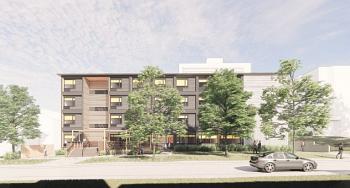Partnership creates new supportive housing in Toronto’s Parkdale
Toronto Mayor John Tory has announced a supportive housing development as part of the City of Toronto’s innovative partnership with University Health Network (UHN) Gattuso Centre for Social Medicine and United Way of Greater Toronto (UWGT).
The proposed, four-storey modular building will house approximately 51 individuals, with a focus on seniors, women, Indigenous Peoples and racialized persons. It is anticipated that the homes will be ready for occupancy in spring 2022. The building will be located on UHN land in Parkdale, on what is now the south parking lot for UHN’s EW Bickle Centre for Complex Continuing Care.
“The new modular homes with supports planned for 150 Dunn Ave. are so much more than just a place to live. These are homes within a vibrant and welcoming community that will improve the health and well-being of those who will live there, as well as the surrounding community,” said Mayor John Tory. “I look forward to opening these new supportive housing units for residents very soon.”
About 7,800 people in Toronto are currently experiencing homelessness and the city is working non-stop to provide safe indoor housing. Modular housing is a response to the urgent need, an innovative and cost-effective way to build new homes at this location. Modular supportive housing provides a rapid, dignified response to connect people experiencing and at risk of homelessness with homes and appropriate supports to help them achieve housing stability.
This project is delivered in partnership with all levels of government, UHN Gattuso Centre for Social Medicine and UWGT.
The new homes will be:
- dedicated to seniors, women, Indigenous residents, racialized people, people with disabilities and other people who are experiencing or at risk of homelessness
- studio apartments with a bathroom and a kitchen
The building will also include shared laundry, a commercial kitchen, a dining area, a communal area, and a programming space.
Local residents will have an opportunity to learn more about this project and to provide input into design elements during an upcoming virtual community engagement session on June 16. Details on how to participate in this process are being delivered to local residents and are also available on the project’s website .
“We know that our most frequent users of hospital services are those without stable, safe housing and are in need of home-based services. Approximately 230 individuals represent more than 15,000 visits to UHN’s emergency departments because they don’t have access to better alternatives,” said Dr. Kevin Smith, president and CEO, University Health Network.
“This first-in-Canada initiative by UHN, made possible through partnerships with the City of Toronto and United Way of Greater Toronto, will make a meaningful difference in the lives of those most in need – a need which has been made even more urgent and apparent as a result of the COVID-19 pandemic. We are grateful to the Government of Canada, the Province of Ontario and the City for these needed investments.”
The capital costs of the homes at 150 Dunn Ave. are being funded through the Government of Canada’s Rapid Housing Initiative (RHI). As part of the RHI’s 2021 Major Cities Stream, the city has been allocated $203.3 million to create approximately 540 new affordable homes. Delivered by CMHC, under the National Housing Strategy (NHS), RHI provides capital contributions to develop new, permanent affordable housing by covering costs associated with modular, multi-unit rental construction; conversion of non-residential to affordable, multi-residential homes; and, rehabilitation of buildings in disrepair and/or abandoned to affordable, multi-residential homes. The project has also secured the city’s Open Door Program incentives.
“To lift people out of poverty, communities need affordable housing and access to social services. These homes with supports are a strong example of the social service sector’s role in community health. Government partners have shown incredible leadership with this investment, made even stronger by working with healthcare, community partners and local residents,” said Daniele Zanotti, president and CEO, United Way Greater Toronto.





